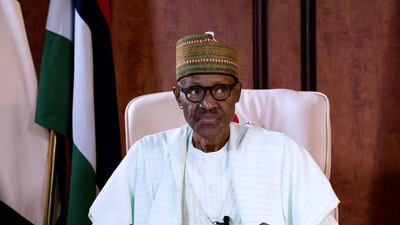Nigerian President Muhammadu Buhari said on Friday that 69 people had been killed in the #EndSARS protests against police brutality, while mobs armed with knives and sticks blocked major roads in Lagos.
The president announced the death toll during a virtual meeting with former leaders and security chiefs.
The protests in Nigeria began on October 7 with mostly young people peacefully demanding the abolition of a notorious police unit, the Special Anti-Robbery Squad (SARS).
But tensions flared on Tuesday night after around 1,000 demonstrators were shot at by security forces without warning on the Lekki Toll Plaza in Lagos, Nigeria's largest city. The international community has since called for a transparent and thorough investigation into the incident.
Since Tuesday's incident, protests have turned violent, with demonstrators vandalising and burning police stations, courts, television stations and a hotel.
When he addressed the nation on Thursday, Mr Buhari, 77, did not mention the Lagos shootings, but instead warned protesters against being used by “subversive elements” that were “undermining national security and law and order”. His comments, which failed to condemn the killing of the protesters, sparked further unrest across the country.
Most of the people who were killed on Tuesday were civilians, the president's spokesperson said in a statement, though police officers and soldiers were also killed. Among them were 51 civilians, 11 police officers, and seven troops. Another 37 civilians were injured in the clashes.
At the meeting, Mr Buhari said his government was committed to meeting the demands of the protesters, but his administration wouldn’t allow "criminals" who had hijacked the protests to continue their "hooliganism".
SARS has been accused of years of violence, including killings, rape, extortion and other breaches.
The president and the country’s police chief, Mohammed Abubakar Adamobsmu, vowed to crack down on the SARS after the protests began, and the unit was disbanded on October 11.
But only days later, the police established a new anti-robbery unit, the Special Weapons and Tactics (SWAT) squad, which many Nigerians saw as a simple rebranding. The protesters are now calling for more far-reaching police reforms to address violence towards civilians.
”Unfortunately, the protesters refused to call off the protest and engage the government to address their grievances. Instead, they became emboldened and gradually turned violent,” Mr Buhari said in the statement.
During the Friday meeting, the former heads of state said that reducing unemployment and providing economic opportunities would help quell the restiveness of the younger generation.
The officials condemned “divisive and inciting pronouncements of separatists” and said that authorities would crack down on those groups. The called on young people to pursue peaceful means of protest, despite Tuesday’s shootings coming after days of non-violent protest.
Troops remained in Lagos on Friday night as a 24-hour curfew was in place to quell the unrest in the city of 14 million people.
"Our beautiful city has seen a level of destruction almost akin to a war zone. It was a shocking and very sad spectacle," Lagos state governor Babajide Sanwo-Olu wrote on Twitter on Thursday.


